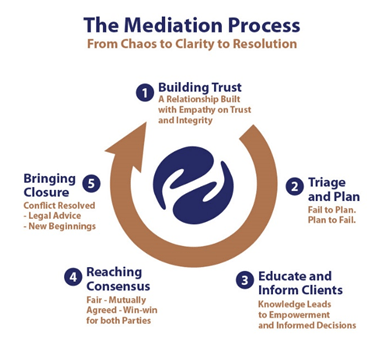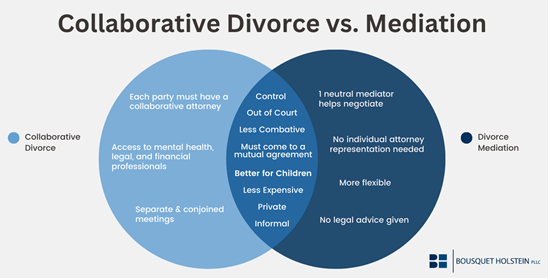“The changes in our life must come from the impossibility to live otherwise than according to the demands of our conscience not from our mental resolution to try a new form of life.”
Mediation
Mediation is an alternative dispute resolution method that has gained popularity among couples seeking a divorce by agreement of the parties. Unlike traditional litigation, mediation allows divorcing couples to work with a neutral mediator to come to mutually agreeable solutions. Here are some key benefits and steps in the mediation process:
Benefits of mediation:
- Provides greater control and flexibility: Mediation allows couples to be directly involved in decisions affecting their lives.
- Promotes open communication: Dialogue between both parties will be productive; mediation helps improve mutual understanding and facilitates compromise.
- Cost-effective: Compared to lengthy court battles, mediation tends to be less expensive as it usually involves fewer legal fees.
The mediation process:
- Initial Consultation: Couples meet with a mediator who explains the process, addresses any concerns, and identifies goals.
- Identification of Issues: The mediator leads a discussion in which both parties voice their concerns about child custody, property division, spousal support, and other issues.
- Developing Options: Through mediator-led negotiations and expertise in divorce law, couples explore various solutions that are in their best interests.
- Reaching Agreements: Once mutually acceptable solutions are found through negotiation or compromise on each issue, they can be formalized into legally binding agreements.
Mediation offers divorcing couples the opportunity to work through difficult decisions, minimizing the conflict and stress associated with conventional litigation dictated solely by existing divorce laws.
Collaborative Law
Benefits of Collaborative Law:
- Collaborative law encourages open communication and collaborative problem-solving to reach solutions that meet the needs and interests of both parties.
- Unlike litigation, collaborative law offers a confidential environment for discussion and negotiation throughout the divorce process.
- By fostering respectful dialog and understanding between spouses, collaborative law seeks to preserve their relationship while they navigate the challenges of divorce.
The collaborative law process:
- Signing a Collaborative Agreement: Both parties agree to resolve their disputes through collaboration instead of going to court. This agreement establishes the principles of transparency, good faith negotiation, and a commitment to finding mutually agreeable solutions.
- Assembling a professional team: In addition to individual attorneys representing each spouse, other professionals, such as financial advisors or child specialists, may be brought in to provide expertise and support during the negotiation process.
- Prioritization: Spouses work with attorneys and other professionals to determine their priorities regarding property division, child custody, spousal support, or any other issues.
- Settlement Negotiation: In joint meetings, facilitated by the joint team members’ experience in family law matters, constructive discussions take place to explore the best options for reaching agreements.
Arbitration
Arbitration offers divorcing couples the opportunity to resolve disputes by bypassing traditional court processes dictated solely by existing divorce laws. It provides confidentiality, competence, and efficiency as couples work toward mutually acceptable outcomes.
Online Dispute Resolution
Convenience and accessibility:
- 24/7 access: Online platforms allow couples to participate in dispute resolution at their convenience.
- Remote participation: Couples can participate in ODR from different locations, reducing travel costs and logistical challenges.
- Flexibility: The asynchronous nature of online communication allows people to take their time when presenting their concerns or suggestions.
Advantages of online dispute resolution:
- Cost-effectiveness: By avoiding traditional litigation, ODR often results in lower legal fees and overall costs associated with resolving divorce disputes.
- Confidentiality: Online platforms provide a safe environment where personal information remains private during discussions and negotiations.
- Mediator or arbitrator involvement: Experienced professionals can guide the process virtually, enforcing relevant divorce laws and facilitating effective communication between both parties.
The online dispute resolution process:
- Choose a suitable online platform that offers secure communication channels specifically designed for dispute resolution.
- Both parties meet virtually with a mediator or arbitrator who explains the process, sets expectations, and makes sure everyone understands how to use the platform effectively.
- Both parties upload the required documents pertaining to property division, child custody, financial matters, and more by utilizing the secure file-sharing capabilities offered by the Harris County divorce forms PDF
- Using videoconferencing or chat functions on the chosen platform, couples participate in mediation discussions led by an experienced professional trained in family law.
- Once a resolution is reached, the mediator or arbitrator helps draft legally binding agreements reflecting mutually acceptable outcomes.
Online dispute resolution provides divorcing couples with an accessible and cost-effective option for achieving an uncontested divorce agreement. Through the use of digital platforms, they can engage in effective communication and negotiation.
Therapeutic Jurisprudence
- Emphasizes holistic support: Divorce is not only a legal issue but also an emotionally complex experience. It emphasizes providing holistic support services along with the legal process.
- Encourages communication and collaboration: This approach promotes open dialog by encouraging people to express their feelings, concerns, and needs in a safe environment.
- Incorporates input from mental health professionals: Therapeutic jurisprudence encourages the involvement of mental health professionals who can provide guidance throughout the divorce process.
- Focuses on long-term well-being: This approach considers the overall well-being of everyone involved in the process, including children, if any.
By incorporating therapeutic approaches into the legal process, couples can move through divorce with greater understanding and compassion for each other’s emotions and experiences.
Negotiation Techniques
- Active Listening: Actively listen to your spouse’s concerns and interests without interrupting or being defensive. Show empathy and try to understand their point of view.
- Focus on interests, not positions: Go beyond the initial demands of each party to focus on the underlying needs and interests. Identifying common ground can lead to more mutually beneficial solutions.
- Joint Problem Solving: Approach negotiations as an opportunity to creatively solve problems together with your spouse. Encourage exploration of ideas and explore alternatives.
- Maintain open communication: Maintain an atmosphere of trust by keeping open lines of communication throughout the negotiation process. Be honest about your needs and concerns while being receptive to feedback from your spouse.
- Seek professional guidance: Consider mediators or collaborative Spousal Support Lawyers who use their expertise in family law matters to help couples negotiate their divorce peacefully.
By utilizing these negotiation techniques, divorcing couples can reach a fair settlement that honors the interests of both parties and creates a cooperative atmosphere.
Parenting Coordinators
- Parenting coordinators serve as mediators or facilitators to help parents resolve disputes and improve communication about child-related issues.
- They help create a comprehensive parenting plan that outlines each parent’s responsibilities and schedule with the best interests of the children in mind.
- Parenting coordinators offer guidance on decisions regarding education, health care, extracurricular activities, and other important issues affecting the well-being of children.
- They ensure that both parents adhere to the terms outlined in the parenting plan and address any violations or disputes that may arise.
Early Neutral Evaluation
An early neutral evaluation serves as a valuable tool for divorcing couples seeking impartial guidance when dealing with complex legal issues. It empowers them to make informed decisions about divorce settlements, avoiding contentious court battles dictated solely by existing divorce laws.
Restorative Justice
- Dialogue and Communication: Restorative justice encourages open and honest dialog between divorcing spouses, giving them a safe space to express their emotions, concerns, and needs.
- Accountability: Rather than assigning blame or punishment, this method emphasizes personal responsibility and accountability for actions taken during the marriage and throughout the divorce process.
- Collaboration: Couples work together with trained facilitators or mediators to find solutions that address not only legal issues but also emotional recovery, co-parenting strategies, financial planning, and other important aspects of their future lives.
- Empathy and Understanding: Restorative Justice recognizes the importance of empathy and understanding for amicable conflict resolution. It encourages divorcing couples to consider each other’s perspectives and seek mutually beneficial solutions.
Hybrid approaches:
- Med-Arb: This approach combines mediation and arbitration, where couples first attempt to resolve their disputes through mediation. If certain issues cannot be resolved through mediation alone, they are taken to arbitration, where a neutral arbitrator makes binding decisions based on divorce laws.
- Arb-Med: In this method, couples start with arbitration, and if necessary issues remain unresolved or new issues arise during the process, move to mediation. The arbitrator’s decisions serve as a starting point for negotiations in subsequent mediation sessions.
- Collaborative Mediation: This hybrid approach combines elements of collaborative law and mediation. Couples work with attorneys trained in both methods who facilitate negotiations while providing legal advice based on divorce laws.
By incorporating hybrid methods for alternative dispute resolution, divorcing couples can explore diverse avenues for addressing their unique needs and concerns, all within the framework of fostering an amicable divorce settlement, potentially minimizing grounds for divorce.


